- Home
- Jeff Mariotte
Blood Quantum Page 2
Blood Quantum Read online
Page 2
Few things were a hundred percent definitive in criminal investigations. The best she could hope for was to develop a preponderance of evidence showing one person's guilt, and that's what she meant to do. The fact that McCann had already confessed to the shooting, and the additional fact that he might never even be charged for it, didn't change that.
"Thank you," she said, putting the swabs carefully back into the kit. She glanced down the drive-way, to where Greg was taking pictures of the body. "Do we know who the deceased is?"
"Yeah," McCann said. "He's a skell. A nutbag. Did you get a whiff of him? Look at that guy. I hate to say he got what he deserved, but -"
"Then don't," Catherine interrupted. "When I look at him, all I see is a John Doe who caught one more bad break in what was probably a long series of them. Everybody deserves his own name – we need to find his out and give it back to him."
"Maybe he just wanted a look at how the other half lives," Sam suggested.
"Yeah," Catherine said. "But instead he found out how his half dies."
2
"Were you the first on the scene?" Greg asked.
The uni named Vernon was young, round-cheeked, and sturdy, with an all-business air that seemed contradicted by his casual way of speaking. "Yes, sir, me and my partner. We were in the area when we got the 420 call. Another car came in right behind us, though."
"Where are your partner and the other cops?"
"Gebhart's the one you saw down at the front gate. He's my partner. The other ones are staffing the command post."
"Who touched the body?"
Vernon 's gaze swept across the paramedics sitting in their van, as if they had nowhere better to be. Even CSIs had the occasional – very occasional – quiet shift, so anything was possible. "Shooter claims he didn't touch him. These guys showed up a couple of minutes after us. Gebhart checked the stiff's pulse, two fingers on the neck, so you'll find his prints. He told EMS that the guy was dead, but they wanted to check it out themselves. I told them not to move the body, but they might have shifted it some."
Greg jotted down a note in a spiral notebook he carried. "They should know better. Who drew the chalk outline?"
"Gebhart did that."
"Is he a rookie?"
"Pretty much, yeah. Couple months on patrol, not many homicides."
"But you know better?"
"I was talking to the suspect, Mr. McCann. When I turned around again, Gebhart's there drawing the outline. I told him to stop, but he was pretty much already done."
"If this goes to court, those crime-scene photos I just took will be inadmissible," Greg pointed out. "The chalk outline shows that the body's been tampered with."
"Sorry about that," Gebhart said. "But Mr. McCann confessed, right? He's head of security here, he told us. I don't see the state filing charges here, do you?"
"It's not my job to know what the state might do. Or yours. It's our job to control the scene and to investigate it."
Vernon 's eyes were downcast. "I know, I screwed up."
"Let's hope it doesn't become a problem."
Greg had taken plenty of photos, showing the approaches from the gate and from the house, photos of the body where it lay – in spite of the chalk outline that he knew would render those photos inadmissible – photos of McCann, and wide shots of the entire scene from every angle. Some of them would never be presented as evidence but would help in reconstructing the scene if necessary and would nudge the memory of the detectives running the investigation. The pictures of the body were still good for that, if nothing else. But he wished that cops who rode patrol had never watched TV shows or movies, because they picked up a lot of bad ideas. He'd heard about a cop who had jumped into his cruiser and tried to drive, letting the wind close his car door, because he had seen it done in a Starsky and Hutch episode on DVD. He had ended up falling out of the vehicle and watching from the ground as it plowed into a garbage truck.
His photos finished, Greg had put the camera away and made a simple sketch of the crime scene in his notebook, showing the placement of the body, the driveway, and the house, noting landmarks such as the rose garden and the property wall. He hadn't had a chance to speak directly to McCann, but Vernon showed him where McCann had claimed to be standing, giving him a quick rundown of the security man's story as he did, and Greg marked that location down with a note reminding himself that it was unconfirmed. He agreed with Vernon that McCann would probably never spend a day in court over this – a licensed security guard shooting an apparently homeless intruder – but that conclusion would have been more cut and dried had the intruder had a weapon. So far, he had seen no evidence to indicate that he did.
Then he turned his fuller attention to the body. The square area defined by the crime-scene tape was mostly empty – no shell casings, no cigarette butts, little of the stray bits of matter that crime-scene investigators had to collect and try to account for, even though most of the time they turned out not to be even remotely associated with the crime. That wasn't something they could know in advance, though, so they bagged and tagged all of it and did the hard part of weeding it out later. This area, though, appeared to have been regularly maintained by what Greg assumed was a full-time staff of groundskeepers, so the pavement was clean and dry except right around the body itself, where blood glinted wetly in the floodlights.
Vernon showed him the route that he, Gebhart, and the EMTs had used to get close to the dead man, and Greg used the same path. Near the body, the smells of the dead man's soiled clothing and his profound body odor were stifling, joined as they were by the metallic tang of blood and the sour-sweet smell of death. Standing as close as he could, Greg noted the details of the man's appearance. He was a Caucasian man, with matted brown hair and a beard shot through with a few strands of silver. He was about five-nine or -ten, maybe a hundred and eighty pounds. A bit of a belly but not much of one. Homeless people generally didn't have to worry about keeping their weight down, and what food they could afford was usually high in empty calories, low in nutritional value. Greg would have been astonished if the dead man wasn't homeless.
He peeled back an eyelid, revealing a bloodshot brown eye. His shirt was torn and bloodstained in two spots, both entry wounds. Greg was sure that if he turned the man over, he would find exit wounds on his back, unless both rounds had stayed inside him. He hadn't seen any bullets or indications of where the rounds had ended up, but once he determined that they had passed through the man – as the amount of blood pooled beneath him indicated – he would have to widen the crime-scene perimeter and look for those.
Greg couldn't get a good read on the man's age, because of the effect of constant exposure to the Nevada sun. The man's mouth was open a little, and his teeth were in terrible shape. Closer examination might reveal some fillings or other dental work, which could help identify him, but those would have been done in his younger days, since he had clearly not been to a dentist in recent years.
Officer Vernon watched from outside the tape line. "Anybody check him for ID?" Greg asked.
"No, sir, not yet."
"Okay, thanks." That was something, at least. It was hard to go through a dead body's pockets without shifting the body around. Now that he had documented the scene as well as possible, he could take that chance.
He started with the jacket pockets. By the time he reached the pants, he had pulled out dozens of scraps of paper, most of them written on and scribbled over so many times that nothing on them was legible at a glance. He was just starting on the pants pockets when another vehicle pulled up, the coroner's van. David Phillips shut off the headlights and got out, pushing his black-framed glasses up on his nose. "Sorry I'm late," he said. "I was on another call."
"No problem," Greg said. "I'm just looking for some ID."
"All that paper and no wallet?"
"Not yet. None of it's money, either. Looks like this guy was big on taking notes, though."
"I guess."
"Hey, David, can y
ou get my camera out of the Yukon? I thought I was done, but I want to take some pictures of all these paper scraps."
David nodded and went to the SUV. When he returned with the camera, Greg showed him the path to follow to the body. "I can take over now, if you want," David said.
"I'm done with him," Greg said. "He's all yours." He took the camera and snapped some photographs of the papers he had removed from the man's pockets. Those and a stub of pencil were all he had found. The John Doe hadn't been carrying so much as a nickel, much less a handy driver's license or passport. Had the night air not been absolutely still, Greg would have worried about wind snatching the scraps away. Had it not been April in Las Vegas, he might have worried about rain. Those were both major concerns with outdoor crime scenes; neither seemed likely to be an issue tonight.
"Thanks," David said. "At a glance, I'd say we know the cause of death. That second shot must have gone straight to the heart. Nice big pool of blood, too."
"Nice," Greg replied.
"From a forensic perspective, I mean." David knelt by the body and drew up the shirt a little so he could see the dead man's back. "Some lividity present," he said. Blood – that which hadn't flowed out through the exit wounds – had been drawn down by gravity and darkened the skin on the side that faced the ground. David touched the dark area, and the skin paled. "Still blanching."
"The security guy here admits to the shooting," Greg said. "Says it happened around midnight."
David glanced at his wristwatch. "One forty-two now. Seems about right. I'll take his temperature."
Greg didn't feel compelled to watch that procedure. He started walking the scene, using a strip pattern – almost like mowing a lawn, starting at one end and walking to the far end, then moving over a step and returning in the direction he had just come from. There were various patterns that could be used, but some were better suited to multiple investigators, and since Catherine seemed to have been waylaid at the command post, he was on his own.
Anyway, he had already determined that there wasn't much to be found. In the bright floodlights, he would have noticed the glint of shell casings. A thought occurred to him, and he called Officer Vernon over. "Do you know what kind of gun the security guard used?"
"I think it was a Colt," Vernon said.
"Automatic? Revolver?"
"Sorry, sir. Thirty-eight revolver."
"Okay, thanks." No shell casings, then – they would stay in the cylinder until they were emptied out. Judging from the story as he had heard it, he wouldn't expect to find much trace evidence anyway. According to Vernon, McCann and the dead man had never actually come into physical contact. You didn't have to get very close to shoot a man in the heart with a.38. The Locard Exchange Principle could still come into play – one of McCann's fingerprints could be on one of the bullets that had killed the man, for instance, and if McCann had come close to the body, even after the shooting, he might have traces of the man's blood on his shoes. But he had the feeling, right out of the gate, that this wasn't a case that would turn on hair or fiber evidence or a mysterious fluid or anything like that.
No, it was probably every bit as straightforward as it appeared to be.
In a way, that would be a relief. These days, it seemed every case he worked was more complicated than the last. Juries were becoming more sophisticated, too, more aware of what crime-scene investigation could accomplish, and the more they knew about it, the more they wanted to see. Greg had heard of open-and-shut cases – a liquor-store robbery, for one, in which the perpetrator had been caught two blocks away downing the six-pack he had taken along with forty-two bucks from the till – in which the jury complained to the judge that there was no DNA evidence presented, and without DNA, how could they know for certain that the defendant was guilty? Never mind the surveillance video, the eyewitnesses, and the fingerprint evidence, juries these days wanted science.
So if this turned out to be a justifiable homicide, an honest man protecting his employer and her property from danger, that would be just dandy. Not every case had to test his forensic skills and challenge his imagination. Or so he wanted to believe.
*
"I should get back down there and help Greg," Catherine said. She had finished swabbing McCann's hands, and she had taken and bagged his windbreaker, in case there was GSR on the sleeves, and his shoes, in case he had stepped in blood. In his socks and short sleeves, he looked like someone caught off guard by a fire alarm.
"Greg's fine," Sam Vega said quietly. "There are more people here I'd like you to meet."
"You're the detective."
"I know that. But I also know you have a good eye for detail, and I don't want to miss anything."
The grunt work was the stuff that had drawn her to forensic science to begin with – collecting and analyzing evidence, employing the cold hard facts of the physical world to put criminals in jail and let the innocent go free. But Sam's point was valid, and in truth, she was more than a little curious about the other folks the police had cooling their heels outside this luxurious home.
Sam led her to a wrought-iron table, painted white, where two men sat waiting for the police to talk to them. A sleepy-eyed uniformed cop stood watch over them, biting on the ends of his mustache hairs as if that was the only thing keeping him awake. Sam went through the introductions, -resenting Catherine to Craig Stilton and Dustin Gottlieb.
"I'm Mrs. Cameron's financial adviser," Stilton said. Everything about him was round – his pale, mostly bald head, his tortoiseshell glasses and the cheeks propping them up, his physique. "Well, the whole family's, really."
"But why are you here tonight?" Catherine asked. "The family's finances aren't involved in the shooting in any way, are they?"
"Of course not," Dustin Gottlieb said before Stilton could answer.
"I was still here when it happened," Stilton said. "I had been working with Helena on some financial matters until late in the evening. When we finished, we were relaxing with a drink. There's a guest room in the house that has, I'm afraid, turned into my home away from home, so I was just getting ready to bid her good night and turn in when all the ruckus started. It was terrible, the shooting and the sirens and all of it. Just awful."
"Where's Mrs. Cameron now?" Catherine asked.
Dustin Gottlieb was built like a tennis pro, with long legs, broad shoulders, and a lean torso. He was tanned, with short dark hair cropped close to his scalp and a friendly, open face. "Ms. Willows, I'm Mrs. Cameron's estate manager. I don't know how much you know about the many stresses on Mrs. Cameron these days…"
"Fill me in."
"Well, heavens. She and Daria have both been very ill. The reason Mr. Stilton was here working with her is that she doesn't expect to live much longer, and she wants to know that everything is squared away before she dies."
Stilton shook his head sadly, but he didn't deny Gottlieb's words.
"And Daria," Gottlieb continued, "her daughter, has gone missing. A couple of days now. We're just frantic over it."
Now that he mentioned it, Catherine remembered hearing something about the young woman's disappearance. Day shift had the case, though, and she had been plenty busy with her own workload, so she hadn't paid much attention to the details. It was hard enough to track her own shift's cases without filling her head with work that didn't immediately concern her. "I'm sorry."
"You know how it is in this city. The police never believe someone is truly missing until years have gone by. Until then, they assume the person is a runaway or having an affair or something."
"There's a large transient population here," Catherine agreed. "People come and go a lot. They don't always leave forwarding addresses."
"Not Daria Cameron. She's a smart young lady, accomplished. She grew up here. She wouldn't just leave voluntarily, and even if she did, she wouldn't do so without telling Helena where she was going. Not after what happened to her father and brother. I wasn't with the family then, but I've heard she was just literally des
troyed by that. She would never do the same thing to her mother. And especially given the state of Helena 's health – neither of them is well, in fact."
"What's the matter with them?" Catherine asked.
"I can't tell you that."
"Why not?"
"Not only is it a personal matter, but the fact is that there is no diagnosis as of yet. All I can say is that they're not in good health. And if nothing else, I believe that would prevent Daria from abandoning her mother."
Catherine could have refuted that argument but didn't see the point in it. Sometimes people went away to die. Sometimes encroaching death brought old family arguments, long since buried, out into the open and set them off again. She would let day shift worry about trying to convince the family and staff of those things – that wasn't what she had come for.
Gottlieb stuffed his hands into his pockets. "So when I heard there had been a shooting on the grounds, I didn't want Mrs. Cameron to know about it. Maybe tomorrow, in the light of day. But not tonight. She's too weak, and her physical and emotional states are too precarious to have to worry about something like that. I interrupted her drink with Mr. Stilton, gave her a pill, and sent her to bed."
"A pill."
"A sleeping pill. Prescription. There are no drug addicts in this house, if that's what you're thinking. But she's not well, and Dr. Boullet provides her with the medication that she needs."
"I wasn't implying anything, Mr. Gottlieb, and I'm sorry if I sounded as if I was. It's just that if she was having a drink -"
"Mrs. Cameron drinks only sparkling water at night, nothing alcoholic. I apologize if I jumped to conclusions, Ms. Willows. I guess all of our nerves are more than a little frayed. Daria's disappearance – particularly in the light of Mr. Cameron and Troy vanishing, ten years ago last month… it's all a bit too much. Just entirely too much."

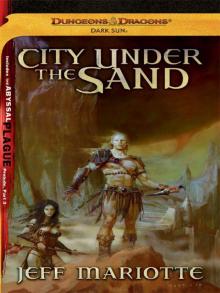 City Under the Sand
City Under the Sand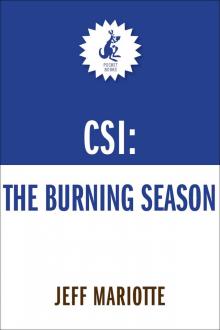 The Burning Season
The Burning Season Sanctuary
Sanctuary Winds of the Wild Sea
Winds of the Wild Sea Serpents in the Garden
Serpents in the Garden Close to the Ground
Close to the Ground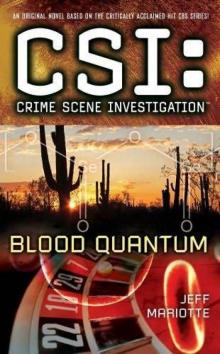 Blood Quantum
Blood Quantum Brass in Pocket
Brass in Pocket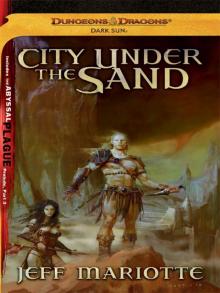 City Under the Sand: A Dark Sun Novel (Dungeons & Dragons: Dark Sun)
City Under the Sand: A Dark Sun Novel (Dungeons & Dragons: Dark Sun)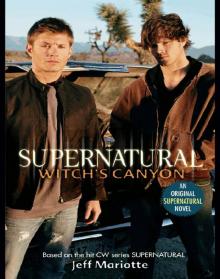 Witch's Canyon
Witch's Canyon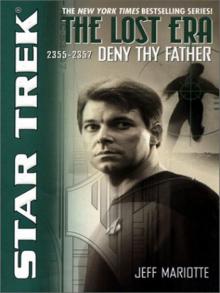 STAR TREK: The Lost Era - 2355-2357 - Deny Thy Father
STAR TREK: The Lost Era - 2355-2357 - Deny Thy Father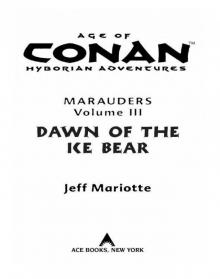 Dawn of the Ice Bear
Dawn of the Ice Bear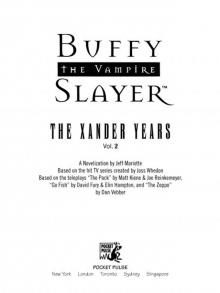 The Xander Years, Vol.2
The Xander Years, Vol.2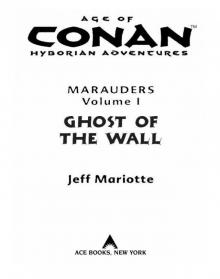 Ghost of the Wall
Ghost of the Wall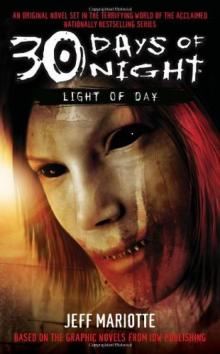 30 Days of Night: Light of Day
30 Days of Night: Light of Day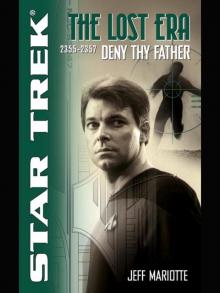 Deny Thy Father
Deny Thy Father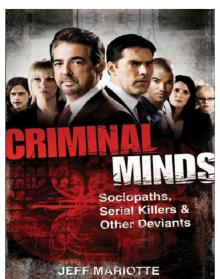 Criminal Minds
Criminal Minds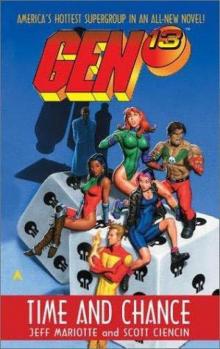 Time and Chance
Time and Chance The Folded World
The Folded World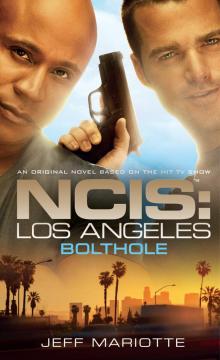 Bolthole
Bolthole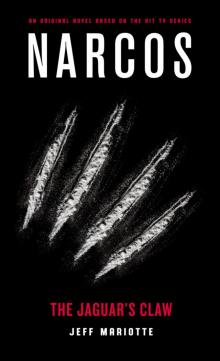 Narcos
Narcos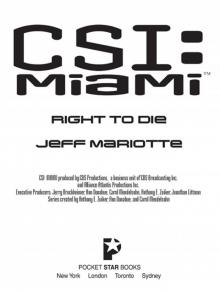 Right to Die
Right to Die